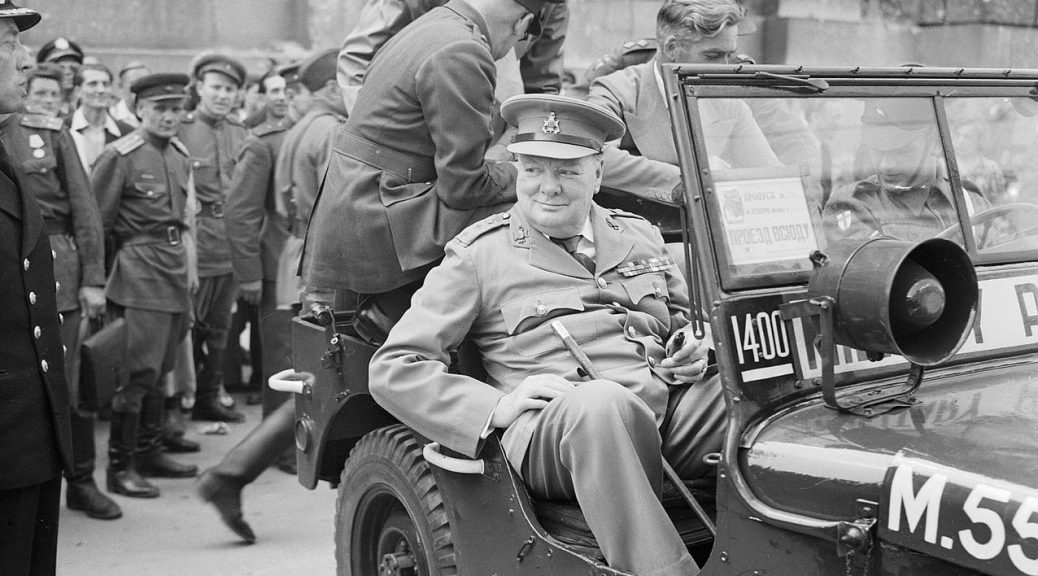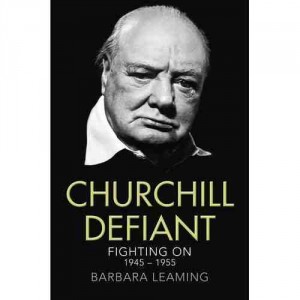
“Churchill Defiant,” by Barbara Leaming: Still the Best on Churchill Postwar
Barbara Leaming: “Others Heard Taps, Churchill Heard Reveille”
Churchill Defiant: Fighting On 1945-1955, by Barbara Leaming. London: Harper Press, 394 pages.
“Great captains must take their chance with the rest. Caesar was assassinated by his dearest friend. Hannibal was cut off by poison. Frederick the Great lingered out years of loneliness in body and soul. Napoleon rotted at St. Helena. Compared with these, Marlborough had a good and fair end to his life.” —Winston S. Churchill, Marlborough: His Life and Times, 1936, Book Two.
A decade on, still a book to read
 Readers sometimes ask for the best books to read on Churchill’s career after the Second World War. The Hillsdale Churchill College Churchill Project names three specialized studies. (Which is not to forget the fine postwar coverage in the great biographies by Martin Gilbert, Andrew Roberts and several others.) The best of the specialized works is over a decade old now. But it’s still hard to improve upon.
Readers sometimes ask for the best books to read on Churchill’s career after the Second World War. The Hillsdale Churchill College Churchill Project names three specialized studies. (Which is not to forget the fine postwar coverage in the great biographies by Martin Gilbert, Andrew Roberts and several others.) The best of the specialized works is over a decade old now. But it’s still hard to improve upon.
On the surface, Barbara Leaming’s book on Churchill’s last ten years of active politics is “popular history.” It runs only 300 pages, tending to substitute paraphrases for lengthy quotes. It carries no conventional footnotes (the back pages provide line references). There is none of the clinical, chronological approach of Martin Gilbert, and little that challenges his findings.
But Leaming adds a unique dimension that places her book well above the long array of potboiler biographies. Really, Churchill Defiant is the most important survey of Churchill’s last active decade since Anthony Seldon’s Churchill’s Indian Summer 40 years ago. And maybe the best yet. It is particularly valuable to young people or others new to Churchill in its keen insight to his lifelong defiance of long odds and formidable foes.
Why did he carry on?
Describing his last political decade, Leaming takes the measure of Churchill’s past experience. For example, she spots something he wrote about gifted people in 1937: “One may say that 60, perhaps 70 percent of all they have to give is expended on fights which have no other object but to get to their battlefield.” That, she observes, nicely describes “the arc of Churchill’s own political career. By the time he had realized his supreme ambition of becoming prime minister, in 1940, he had spent decades fighting to reach his particular battlefield. Again, after being hurled from power in 1945, Churchill dedicated an additional six years to fighting his way back.”
Why did he fight on after 1945? In two words: world peace. It was, he said repeatedly, “the last prize I seek.”
Churchill considered himself uniquely gifted for what he called “parleys at the summit.” Even at Fulton, as he warned of the Iron Curtain, he believed that if only the heads of government could sit down together, the danger of Apocalypse could be eased. Repeatedly he risked rupturing the special relationship he valued above all others, challenging a reluctant Eisenhower to meet with him and the Russians. Most notable, Leaming writes, was his speech of 11 May 1953, which she regards an equal to his great war speeches. “Where others heard taps,” she concludes, “Churchill heard reveille.”
The Leaming touch
Leaming relies heavily on diaries and memoirs of the primary players (but is carefully circumspect about the views of Churchill’s doctor Lord Moran). She constructs an intensely personal portrayal of Churchill, his colleagues and adversaries, led by Stalin and Eisenhower. And make no mistake, Eisenhower was an adversary. Rosy portraits of their relationship have obfuscated Churchill’s mixed views of Ike as President. Churchill deemed him short on vision, stagnant in thinking, and subservient to Secretary of State John Foster Dulles, “whose breath stank and whose left eye twitched incessantly and disconcertingly.” Eisenhower sent Dulles at regular intervals “to try to turn Churchill from his purpose.”
The reader is at Churchill’s shoulder from page 1. There, in Berlin in 1945, he descends the stairs to Hitler’s bunker, hesitates halfway down, turns and climbs wearily back. When a Russian soldier shows him where Hitler’s body was burned, he looks away in revulsion. Again in 1946 in Miami, Leaming has him “seated on a bed of red poinsettias near the pink brick seaside house,” his tropical tan suit “snugly across his stomach,” pondering what to say at Fulton. We read parallel sketches of Stalin around the same time, holidaying on the Black Sea. The Soviet chief is ailing, exhausted, paranoid, suspicious of plots, and is torturing a former doctor he believes is a spy. The contrast is palpable.
Perception and understanding
Leaming’s insight is extraordinary. Why, for example, did Truman invite Churchill to Fulton for what became known as the “Iron Curtain Speech“? Wasn’t Truman was seeking to avoid confrontation with Moscow? “At a time when Truman had yet to emerge from Roosevelt’s shadow,” Leaming observes, “it might be difficult politically to depart from his predecessor’s Soviet policy. The Fulton speech, delivered by a private citizen who also happened to be a master of the spoken word, as well as a figure of exceptional appeal to Americans, would allow Truman, at no political cost to himself, to see if the public was ready to accept a change.” (67)
Clementine Churchill is quoted sparingly yet understood intimately—better indeed than by some of her recent biographers. From the 1945 election she yearned for her husband to retire. In their daughter Mary’s words, she would “gladly exchange the splendours and miseries of a meteor’s train for the quieter more banal happiness of being married to an ordinary man.” Yet she backs him, wishing him go on his terms. She responds angrily when outsiders urge her to intervene. Asked in mid-1954 if she wanted Winston to retire, she replied: “Yes I do indeed. But I don’t wish to be told that by Mr. Harold Macmillan.”
Churchill’s familiars
Churchill’s Tory colleagues do not show well in Leaming’s light. Nearly to a man, they hoped he would retire as early as 1945, each of them in profound self-interest. “Bobbety” Salisbury wanted Anthony Eden, knowing he could not as easily control “Rab” Butler. Butler dangled a coalition before Labour as a way to supplant Eden as heir apparent. Macmillan first shunned the retirement cabal, hoping it would fail, paving his own way to the top. But he urged Clementine and private secretary Jock Colville to tell Winston to go.
Eden, ever the prevaricator, flopped first one way and then the other over demanding Churchill quit. No wonder the wheels nearly came off the Churchill Cabinet at several junctures.
Better than anyone, Leaming shows the degree of separation between WSC and Eden. Recall Churchill’s 1936 remark when Eden became foreign secretary: “I think you will now see what a lightweight Eden is.” Churchill Defiant reminds us of what WSC said the night before his resignation as Prime Minister in April 1955: “I don’t believe Anthony can do it.” Churchill’s judgment was on the mark.
Eden resigned soon after Eisenhower refused to back his march on Suez in 1956. “He could be a prickly and peevish character,” but was circumspect with Churchill. Leaming quotes the historian P.J. Grigg: Eden was notorious for “bullying people who could be bullied, and collapsing before those who couldn’t.” (137)
Unspecial relationships
The book leaves us with poignant and sorrowful realizations, national and personal. Nationally, Britain’s place in the world fell precipitously in the decade after the war. The “special relationship” proved more special to London than to Washington. The disagreements over a summit evolved to a major rupture over Suez.
On the personal level, Churchill, as he wrote of Marlborough, “had a good and fair end to his life.” He never gave in. He faced down colleagues who pressed him to retire with all the resolution of his joust with Hitler. And he gloried in battles won, as when turning somersaults in the sea for actress Merle Oberon after a great speech in Strasbourg. He despaired when he hit a stone wall, like Eisenhower at Bermuda. (When asked about their next meeting in Hamilton, Eisenhower replied, “I don’t know. Mine is with a whisky and soda.”)
Honour and good sense
Never give in, he had told the boys at Harrow: Never give in, except to convictions of honour and good sense….” Who can say whether he was right or wrong about a summit with the Russians? It was never tried. When honour and good sense told him it was time, Churchill went—convinced that a summit was beyond his declining powers.
Barbara Leaming offers no summary chapter, no list of the faults or mistakes by Churchill or other players in the drama. Unlike certain authors, she does not suggest that anyone, by their actions, changed history. But her opinions register throughout the book, and nowhere more forcefully than toward the end:
When Churchill refused to retire in 1945, his decision had flowed from everything that was essential in his character; so did his subsequent decisions to fight on. At the beginning of 1955, the decision that confronted Churchill was different, harder. This time, rather than ride the wave of his obstinacy, he had to overcome it. He had to crush his lifelong refusal to accept defeat. He had to conquer the primal survival instinct that had allowed him to spring back so many times before. This time, Churchill’s battle was not really with Salisbury, Eden, Eisenhower or any antagonist. It was with himself. (306)






